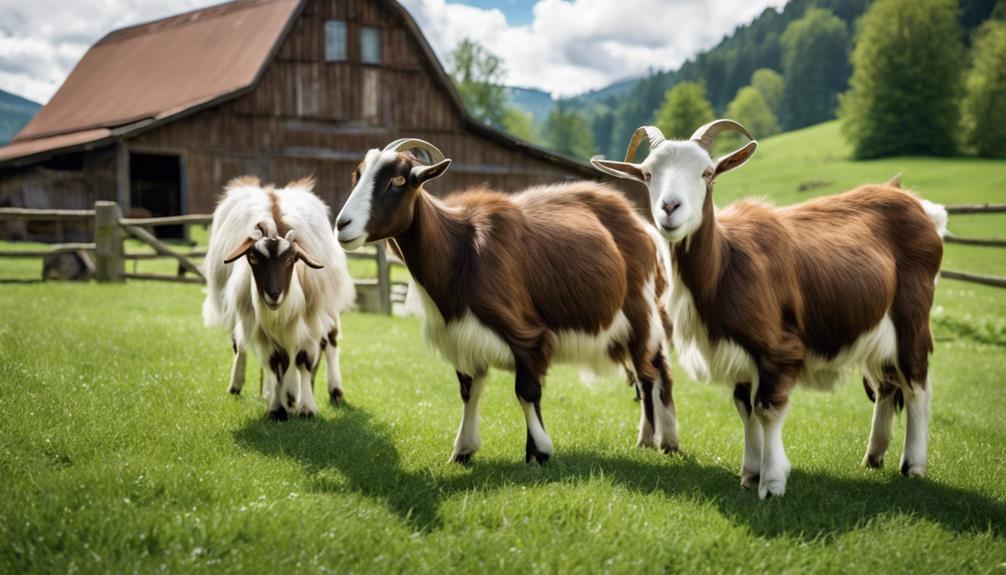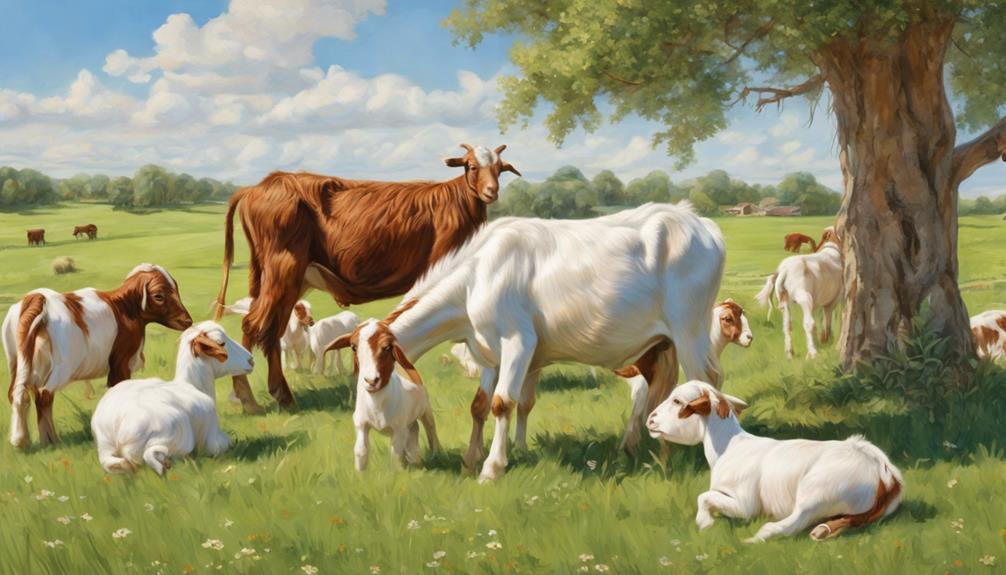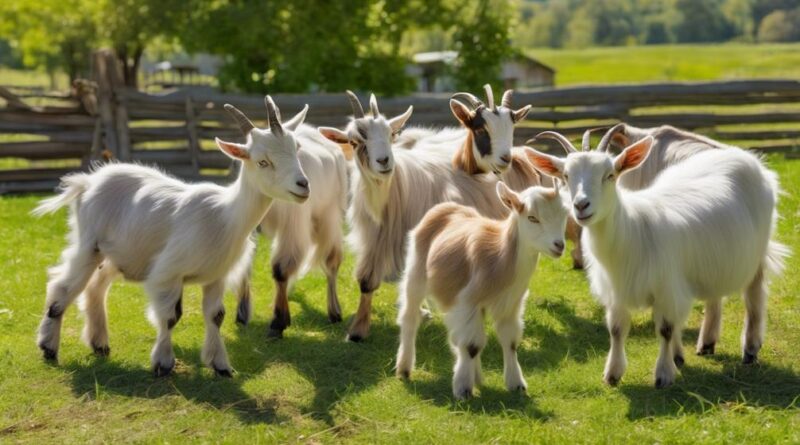10 Best Docile Goat Breeds for Families
Choosing docile goat breeds can make family life more enjoyable and manageable. Nigerian Dwarf and Pygmy goats are great for small spaces and children. Nubians offer high butterfat milk ideal for dairy products. LaManchas and Saanens provide robust milk production and calm temperaments. Toggenburgs and Oberhaslis are dependable milk producers with friendly natures. Boers and Kinders not only supply milk but also serve dual-purpose roles for meat. These breeds exhibit gentle, sociable behavior, minimal grooming needs, and adaptability to various climates. Continue to discover which breed aligns best with your family's specific needs.
Nigerian Dwarf Goats
Nigerian Dwarf Goats are highly regarded for their manageable size and gentle temperament, making them an excellent choice for family settings. These diminutive goats typically weigh between 60 to 80 pounds and stand about 17 to 20 inches tall, which facilitates ease of handling and care. Their amiable disposition is well-documented, showing a proclivity for human interaction and affection, an attribute particularly beneficial in family environments.
In terms of milk production, Nigerian Dwarf Goats are exceptional. They can produce up to two quarts of milk per day, with a butterfat content ranging between 6 to 10 percent. This high butterfat content not only enhances the flavor but also makes the milk highly suitable for cheese and yogurt production. Families can take advantage of this by incorporating fresh, nutritious dairy products into their daily diet. Additionally, the smaller udder size of these goats makes milking an uncomplicated process, even for beginners.
The pet benefits of Nigerian Dwarf Goats are noteworthy. Their sociable nature makes them excellent companions, especially for children. Research indicates that interactions with animals can significantly reduce stress and improve overall mental well-being. Nigerian Dwarf Goats are also known for their playful behavior, which can provide both entertainment and opportunities for physical activity for family members. They can easily adapt to various living conditions, provided they've adequate shelter and pasture space.
Pygmy Goats
Shifting focus to another popular choice for family-friendly goats, Pygmy Goats are renowned for their compact size and remarkably gentle nature. Originating from West Africa, these goats have been selectively bred to maintain their small stature, making them ideal for families with limited space. Their miniature size, typically measuring around 16 to 23 inches at the withers, allows for ease of handling, particularly beneficial for children and elderly family members.
Pygmy Goats exhibit a docile temperament, characterized by their affectionate and inquisitive behavior. These attributes make them excellent companions and easy to integrate into family settings. Evidence-based studies have shown that regular interaction with humans can further enhance their sociability, leading to a more rewarding pet ownership experience.
Grooming needs for Pygmy Goats are relatively minimal, yet essential for maintaining their health and well-being. Their dense, medium-long coat requires regular brushing to prevent matting and to remove debris. Monthly hoof trimming is necessary to prevent overgrowth and associated lameness. Additionally, routine health checks should be performed to monitor for common issues such as parasites and respiratory infections.
Pygmy Goats are also known for their adaptability to various climates, although they thrive best in moderate weather conditions. Providing adequate shelter and a balanced diet, rich in hay, grains, and fresh water, ensures their optimal health. Their miniature size reduces the required space for housing, making them a feasible option for urban and suburban environments.
Nubian Goats
Nubian Goats, known for their distinctive long ears and sociable nature, are an excellent choice for families seeking a docile and versatile breed. These goats exhibit a strong disposition for human interaction, making them particularly suitable for family environments. Their adaptability to various climates further enhances their desirability for diverse geographical locations.
When it comes to breeding practices, Nubian goats demonstrate significant advantages. Selective breeding has focused on enhancing both docility and milk production, resulting in a breed that excels in both areas. You'll find that Nubians are relatively easy to manage due to their calm demeanor and their cooperative behavior during milking and handling. Their reproductive efficiency is noteworthy, with does typically producing multiple offspring per kidding, which can be beneficial for expanding your herd.
Nubian goats are renowned for their high-quality milk production. Their milk contains higher butterfat content compared to other breeds, averaging around 4-5%, which makes it ideal for producing rich, creamy dairy products such as cheese and yogurt. This not only provides a nutritious option for your family but also offers potential for small-scale commercial dairy ventures. The consistent lactation periods and substantial milk yield make Nubians a reliable choice for those prioritizing dairy production.
LaMancha Goats
LaMancha goats, distinguished by their unique, almost non-existent ears, offer a tranquil temperament and robust milk production, making them another excellent choice for family-friendly goat breeds. Their distinctive ear structure, known scientifically as 'gopher ears' (less than 1 inch in length) or 'elf ears' (maximum of 2 inches), is the result of a genetic mutation and doesn't affect their hearing or health.
From a clinical perspective, LaMancha goats exhibit an exceptional capacity for milk production, yielding between 1,800 to 2,100 pounds of milk annually. This high milk yield is often attributed to their efficient conversion of feed into quality milk, rich in butterfat and protein, essential for various dairy products.
If you're considering a goat for both companionship and practical benefits, LaMancha goats are an excellent choice due to this dual utility. Their temperament is another critical factor. LaManchas are known for their docile, friendly nature, making them easy to handle and less likely to exhibit aggressive behaviors. This calm disposition is particularly beneficial in family settings where children are involved, ensuring safe, positive interactions.
Moreover, the breed's unique appearance sets them apart from other goat breeds, often sparking interest and endearment. Their distinctive look can be a source of fascination and a talking point, adding an element of novelty to your household.
Saanen Goats
Saanen goats, renowned for their exceptional milk production and gentle demeanor, are a top choice for families seeking a reliable and friendly breed. Originating from the Saanen Valley in Switzerland, these goats have garnered a reputation for their docility and impressive lactation capabilities, making them ideal for both novice and experienced goat keepers.
Saanen goats are particularly valued for their high milk yield, which can average between 1-3 gallons per day. Their milk isn't only abundant but also of high quality, containing a balanced composition of protein and butterfat. This makes Saanen milk highly suitable for producing cheese, yogurt, and other dairy products, contributing to their popularity in family farms and homesteads.
Moreover, Saanen goats are known for their gentle temperament. They're generally calm, easy to handle, and sociable, making them an excellent choice for families with children. Their friendly nature reduces the risk of aggressive behavior, thereby ensuring a safer and more enjoyable goat-keeping experience.
Here are some key benefits of raising Saanen goats:
- High Milk Production: Saanens can produce up to 3 gallons of milk daily, providing a steady supply for your family's dairy needs.
- Gentle Temperament: Their calm and friendly nature makes them easy to manage and less likely to exhibit aggressive behavior.
- Adaptability: Saanens are highly adaptable to various climates, though they prefer cooler environments.
- Low Maintenance: These goats require minimal special care, making them suitable for beginners.
Alpine Goats
Originating from the French Alps, Alpine goats are celebrated for their robust milk production and hardy nature, making them a versatile choice for family farms. Their adaptability to various climates and strong foraging abilities ensure they thrive in diverse environments.
Known for their consistent lactation, Alpine goats can yield between 1,500 to 1,600 pounds of milk annually, with a butterfat content ranging from 3.5% to 4%. This high milk production makes them a reliable source of dairy products, including cheese, yogurt, and kefir.
Alpine goats exhibit temperament traits that are particularly suitable for families. They're friendly, sociable, and curious, often forming strong bonds with their caretakers. Their docile nature ensures they're manageable for both adults and children, reducing the risk of injury during handling. Additionally, their inherent intelligence allows for easy training, making them cooperative during milking and grooming procedures.
When considering the integration of Alpine goats into your family farm, it's important to acknowledge their specific care requirements. They thrive in clean, spacious environments with access to fresh water and a balanced diet rich in hay, grains, and minerals. Regular veterinary check-ups are essential to monitor their health and prevent common ailments such as mastitis and parasites.
Toggenburg Goats

Toggenburg goats, one of the oldest known dairy breeds, are renowned for their consistent milk production and gentle temperament, making them an excellent choice for family farms. Originating from the Toggenburg Valley in Switzerland, these goats have a long history of being robust and reliable. Their milk is known for its high protein content, which is ideal for cheese-making.
When considering Toggenburg goats for your farm, you should note the following key points:
- Milk Production: Toggenburg goats are prolific milk producers. On average, a Toggenburg doe can yield around 2,000 pounds of milk per lactation period. This milk isn't only abundant but also rich in essential nutrients, including proteins and fats, making it highly valuable for both consumption and dairy products.
- Temperament Traits: Toggenburg goats are known for their calm and friendly demeanor. These goats are particularly good with children, making them an ideal breed for families. Their docile nature also means they're easier to handle and less likely to become stressed or aggressive, which can further improve milk yield.
- Adaptability: Toggenburg goats are highly adaptable to various climates and conditions. Whether you have a small backyard farm or a larger agricultural operation, these goats can thrive in diverse environments, provided they've adequate shelter and nutrition.
- Longevity and Health: These goats are typically hardy and have a longer lifespan compared to some other dairy breeds. Regular veterinary care and a balanced diet can help maintain their health, ensuring they remain productive and gentle members of your farm for many years.
Oberhasli Goats
Oberhasli goats, known for their striking bay coloration and black markings, offer a unique combination of high milk production and calm temperament, making them a valuable addition to family farms. Originating from the mountainous regions of Switzerland, these goats have been selectively bred to enhance both their productivity and docility.
When evaluating Oberhasli goats for milk production, you'll find that they excel, producing an average of 1,500 to 2,000 pounds of milk per lactation cycle. Their milk is moderately high in butterfat content, approximately 3.5%, which is ideal for making cheese and other dairy products. The milk yield and quality make them a preferred choice for families looking to sustain daily dairy needs.
In terms of temperament traits, Oberhasli goats are notably docile and easy to handle. Their calm demeanor makes them particularly suitable for families with children or those new to goat farming. These goats exhibit low reactivity to environmental stressors, which translates to less erratic behavior and easier management. Their social nature and compatibility with other livestock further enhance their appeal as family-friendly animals.
Moreover, Oberhasli goats demonstrate robust health and adaptability to various climates, reducing the likelihood of frequent veterinary interventions. Their manageable size, typically weighing between 120 to 150 pounds, allows for ease of maintenance and reduces the risk of handling-related injuries.
Boer Goats

Boer goats, known for their robust build and rapid growth rates, are an excellent choice for meat production on family farms. Originating from South Africa, Boer goats have been selectively bred to enhance traits desirable for meat production, such as substantial muscle mass and high feed conversion efficiency. These characteristics make them particularly well-suited for families looking to raise goats for meat.
Boer goats exhibit exceptional growth rates, often reaching market weight faster than other breeds. This rapid growth translates to a quicker return on investment, making them a financially sound option. Their docile temperament also makes them easier to handle, reducing the stress on both the animals and the handlers.
Here are some key advantages of raising Boer goats for meat production:
- High Feed Conversion Efficiency: Boer goats convert feed into body mass more efficiently than many other breeds, leading to cost savings on feed.
- Rapid Growth Rate: They can reach market weight within 90 to 120 days, significantly faster than other breeds, which supports quicker turnover and faster meat production cycles.
- Resilient Health: Boer goats are known for their robust immune systems and resistance to common goat diseases, reducing veterinary costs and ensuring a healthier herd.
- Adaptability: They thrive in various climates and can adapt to different feeding regimes, making them versatile for diverse farming environments.
Incorporating Boer goats into your family farm can be a strategic move for optimizing meat production, given their exceptional growth rates and efficient feed utilization. Their adaptability and robust health further enhance their value, ensuring that you benefit from a hardy, productive herd.
Kinder Goats
Kinder goats, a hybrid breed resulting from the crossbreeding of Pygmy and Nubian goats, are highly regarded for their dual-purpose capabilities in both milk and meat production. These goats exhibit a robust constitution, making them highly adaptable to various environmental conditions.
Their milk production is notable, with a high butterfat content that enhances its creaminess and nutritional value, making it ideal for cheese and yogurt production.
You'll find that Kinder goats are exceptionally efficient in terms of feed conversion, meaning they require less feed to produce milk and meat compared to other breeds. This efficiency translates to lower maintenance costs, making them an economically viable option for small-scale farmers and family homesteads.
In terms of temperament, Kinder goats are known for their docility and friendly nature, which makes them particularly suitable for families, including those with young children. They're curious and social animals that thrive on interaction, thus fostering a positive environment for both the goats and their human caretakers.
The color variety of Kinder goats is another appealing characteristic. They come in an array of colors and patterns, from solid coats to intricate markings, which adds an element of aesthetic pleasure to goat-keeping. This diversity not only enhances visual appeal but also makes it easier for you to distinguish between individual animals.
When considering Kinder goats for your family, you're choosing a breed that excels in milk production and offers a delightful range of colors. Their gentle disposition and low maintenance requirements further underscore their suitability for family-oriented farming endeavors.
Frequently Asked Questions
What Should I Consider When Building a Goat Shelter?
When building a goat shelter, you should prioritize effective ventilation systems to ensure optimal air quality and prevent respiratory issues.
Incorporate predator protection measures, such as secure fencing and robust locks, to safeguard your goats.
Ensure the shelter is weather-resistant and provides adequate space for movement and resting.
Utilize materials that are durable and easy to clean to maintain a hygienic environment and reduce disease risks.
How Do I Prevent Common Goat Diseases?
Oh, you thought goats were naturally disease-resistant? Think again.
To prevent common goat diseases, stick to strict vaccination schedules and implement robust parasite control measures. Regularly administer vaccines for diseases like enterotoxemia and tetanus.
Use dewormers based on fecal egg counts to manage internal parasites effectively. Also, maintain proper sanitation and nutrition to boost their immune system.
Your goats will thank you, even if they don't show it.
What Is the Average Lifespan of Domestic Goats?
Domestic goats typically live around 10 to 15 years. Lifespan factors include genetics, nutrition, and healthcare.
Effective breeding practices enhance longevity by selecting for robust health traits. Regular veterinary care, proper diet, and disease prevention are crucial.
How Much Space Do Goats Need to Roam?
Goats need generous grazing grounds to get good goat exercise. Experts recommend at least 250 square feet per goat for free range benefits. This space supports their natural browsing behaviors and prevents boredom-related issues.
Evidence-based studies show that ample room reduces stress and enhances overall health. Ensuring sufficient space allows goats to exhibit natural behaviors, promoting physical fitness and psychological well-being. Thus, proper pasture planning is paramount for optimal goat care.
What Are the Dietary Requirements for Goats?
When considering the dietary requirements for goats, you need to ensure a proper nutrient balance. Goats require a mix of roughage like hay, grains, and fresh browse.
Mineral supplements are crucial for preventing deficiencies; provide a free-choice mineral block specifically formulated for goats. Fresh water should always be available.
This balanced diet supports optimal growth, reproduction, and overall health based on evidence-based livestock management practices.
Conclusion
When choosing a goat breed for your family, consider these ten docile options. Like selecting the right cast for a play, each breed brings unique attributes to the pastoral stage.
Nigerian Dwarfs enchant with their small size, while Saanens offer prolific milk production. Evidence shows that these breeds—like LaManchas with their distinctive ears—are not just pets, but valuable contributors to your homestead.
Making an informed choice ensures harmony and productivity in your family's farm life.
